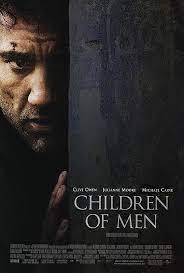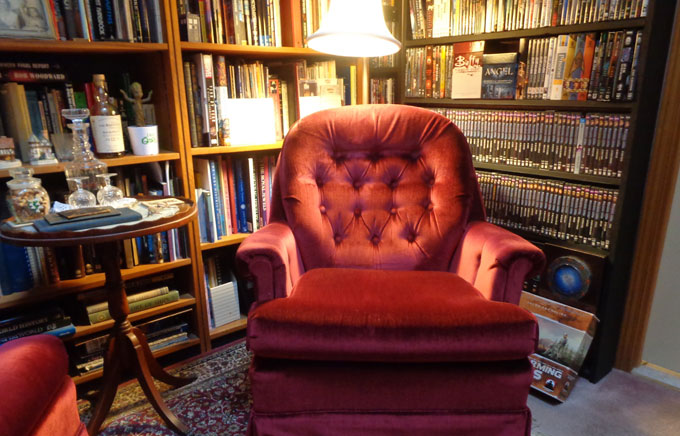
In 2027, 18 years after the human race became infertile, followed by war, depression, and social collapse, humanity is on the edge of extinction. The U.K. has become a police state in response to a flood of refugees from all over the world.
Theo Faron (Clive Owen), a cynical bureaucrat depressed by the death of a child, is kidnapped by a militant-rights group called the Fishes, led by his estranged wife, Julian Taylor (Julianne Moore). She offers to bribe him for transit papers for a young African refugee named Kee (Claire-Hope Ashitey). He gets those papers from his cousin, a government minister who salvages art. He agrees to escort Kee, Theo, and Julian to Canterbury, but they are ambushed and Julian is killed. Later, two policemen stop them, but the Fishers’ driver Luke (Chiwetel Ejiofor) kills them and takes everyone to a safe house.
Kee shows Theo that she is pregnant, the first woman in that state in 18 years. She is supposed to be taken to the Human Project, a scientific group in the Azores, but Luke convinces her to stay in the U.K. Theo overhears that he is to be killed and the baby used as a political tool in a revolution. He warns Kee and Miriam, her midwife (Pam Ferris), and they steal a car to flee to the home of Theo’s old friend Jasper Palmer (Michael Caine), a former political cartoonist and pot-dealer.
They plan to board the Human Project ship, The Tomorrow, disguised as a fishing vessel. Jasper suggests that his friend Syd (Peter Mullan), an immigration cop, smuggle them to the city of Boxhill, now a refugee camp, where the ship will dock. As they leave, the Fishes storm Jasper’s home. He kills his catatonic wife before he is killed by the Fishers. The escapees meet Syd at an abandoned school and he puts them on a bus to Bexhill. There is a tense moment when Kee has contractions.
Inside the camp, they meet a Romani woman named Marichka (Oana Bellea) who provides a room in which Kee gives birth to a baby girl. War has broken out between the British Military and the Fishes rebellion. Syd tries to capture them for the bounty, but Theo kills him and they escape. The Fishes capture Kee and the baby, but Theo traces them and extracts Kee and the baby from the tenement where they are kept. In a powerful scene, both sides in the war stop fighting and stare reverently as the baby is carried past them. As British fighter-planes attack the city, Theo and Kee and the child row out to the rendezvous point for the boat, but Theo reveals that he is injured and dies as the boat approaches.
The film was co-written and directed by Alfonso Cuaron, from a screenplay based on the novel by P.D. James. It was released to critical acclaim and nominated for three Oscars, three Baftas, and three Saturns. Cuaron disliked exposition in cinema and never attempted to explain why the human race is suddenly infertile. The religious angle of the story is kept in the background, as are the political overtones, but with a sharp eye you can pick them out. Throughout, Cuaron’s genius with time-consuming, single-shot camera work made for remarkable action scenes, though many had artfully hidden CGI enhancements.
There is an animal, usually a dog, in every shot. Throughout the movie, animals seem to be drawn to Theo. In the background of one shot is the London office building called the Shard, whose construction began three years after the movie was made, but before the future setting of the film. It was added digitally to the London skyline. Many of the political events in the film seemed to be predicted, such as a world-wide pandemic and various political crises. In a scene with a wall covered in newspapers, every story in the papers had to be written even though they could hardly be seen on the screen. Picasso’s Guernica is prominently displayed in the film. The whole film is powerful, often beautiful, and sometimes terrifying.
